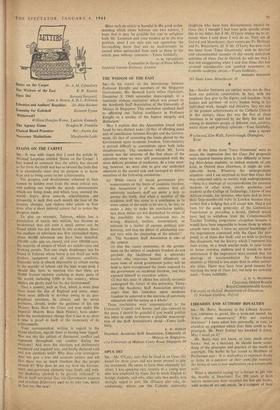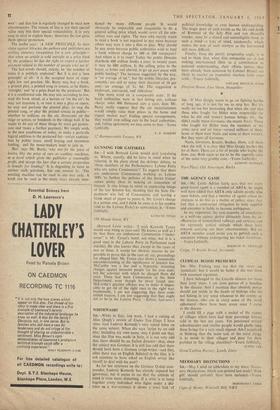LIBRARIES AND AUTHORS' ROYALTIES SIR,—Mr. Barry, Secretary to the Library
Associa- tion, continues to growl, like a worn-out record. his 'What about motor-cars? Why not washing • machines?' I have asked him personally, in vain, to abandon an argument which does little credit to his principals. Mr. Peter Forster has knocked it down. May I tread on it?
Mr. Barry may not know, or care, much about books: but, as a barrister, he should know some- thing of the principles and.practice of the world of copyright. The leaflet he has issued to Members of Parliament says : 'It is misleading to represent books as being hi a category of *their own;.-for example. the hiring of cats is now undertaken on a comparable scale.'Wh at a shameful saying for a 'lawyer to put into the mouths of. librarians! For 200 years at least before motor-cars were invented the law put books, with works of art and music, 'in a category of their own': and that law is regularly changed to meet new circumstances. The reason of this is not their special value only but their special vulnerability. It is very easy to steal or exploit them: therefore the law gives them special protection.
The leaflet says: 'A NEW PRINCIPLE. In their claim against libraries the authors and publishers are seeking statutory recognition for a new principle— that when an article is sold outright at a price fixed by the producer he has the right to expect a further payment related to the number of people who use it.'
The last words should, strictly, be 'the number of times it is publicly exploited.' But rt is not a 'new principle' at all: it is the accepted basis of copy- right law and practice. Mr. Barry may buy a book, a printed play, a printed song or sonata, as he thinks, 'outright,' and 'at a price fixed by the producer.' But it is a conditional sale. He may not, according to law, read the book aloud, at a lecture or 'on the air'; he may not translate it, or turn it into a play or opera, he may not perform the printed play, or sing the printed song, or play the printed sonata in public— whether to millions on the air, thousands on the stage or screen, or hundreds in the village hall. If he wants to do any of these things he must get permis- sion and 'make a further payment:- We simply wish, in the new conditions of today, to make a perfectly logical addition to the protected list—unfair exploita- tion by Public loans, small buying and enormous lending: and the music-makers want to join us.
'But,' says Mr. Barry, 'why not fix the price of books, like the price of cars or washing machines, at a level which gives the publisher a reasonable profit, and accept the fact that a certain proportion is bought for lending?' It is degrading to have to answer such questions, but one answer is: 'The washing machine can be used in one way only. A book can be used in the many ways already men- tioned—by many different people. It would obviously be impossible and inequitable to fix a general selling price which would cover all the sub- sidiary uses and rights. The man who merely wants to read a book is not required to pay more because others may turn it into a film or play. Why should he pay. more because public authorities wish to lend a book without charge to 100 or 200 ratepayers? And where is it to stop? Today the public libraries distribute 400 million books a year; in twenty years it may be 600 million, Is the selling price to the buyer, at home and abroad, to go up pail passu with public lefiding? The increase suggested, by the way, is "an average of 6d.": but the public libraries, pre- sumably, are still to enjoy their discount of 10 per cent.— an average of Is. 6d. The suggestion is irrelevant, anti-social, and ridiculous.'
One more word on 'a comparable scale. If the local authorities were in fact letting out, without charge, etien 400 thousand cars a year, does Mr. Barry really suppose that the car manufacturers would simply raise their prices in the home and export market too? Failing special arrangements, they would stop selling cars to the local authorities; and, failing agreement, we may come to that.—Yours faithfully, 12 Hammersmith Terrace, 11'6
A. P. IIIIRBERT











































 Previous page
Previous page